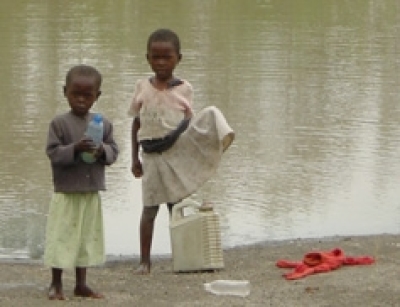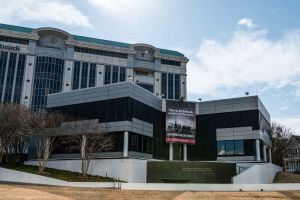Dire Food Shortages Predicted For Sub Saharan Africa
At a press conference to launch of the CGIAR Challenge Program on Water and Food, scientists warned that many countries in Sub-Saharan Africa could face a future of increasing malnutrition and dependence on food aid unless steps are taken to address water scarcity across the region.

As one of the international communities responses to the growing global water crisis, the Challenge Program's research agenda will unite international and national research institutes, NGO's and local communities across the globe in an effort to find innovative ways of producing more food by using less water.
Water scarcity projections for Sub-Saharan Africa paint a bleak picture. Investments in water infrastructure lag way behind demand. By 2025 household water consumption will experience the highest proportional increase of any region of the world. Even with business as usual policies and investments, the number of people without access to clean water will more than double to 636 million. Under a worst case water scenario this figure could rise to 831 million people.
The region will face a 23 per cent shortfall in crop yields due to insufficient water supply and cereal imports will have to more than triple to 35 million tons in the next 23 years to keep pace with demand. Under these conditions many poorer African countries will be unable to finance the required imports of food leading to rising levels of hunger and malnutrition and greater dependence on international financial support or food aid.
"If present trends continue the livelihoods of one third of the world's population will be affected by water scarcity by 2025. We could be facing annual losses equivalent to the entire grain crops of India and the US combined. The crisis has to be addressed comprehensively at all levels, from the way farmers use water to international policy decisions that affect reforms and investments in water management and infrastructure", explains Prof. Frank Rijsberman, Chairman of the Challenge Program on Water and Food Consortium.
The Challenge Program was launched at a conference attended by senior scientists and policy-makers who gathered to debate some of the key issues surrounding the water, food and environment agenda. One debate focused on the impact that international trade in food and virtual water has on water demand and use.
"Agricultural subsidies in North America and Europe determine where food is grown and policy decisions taken in the World Trade Organisation are possibly the single most dominant factor shaping the global demand for food and consequently the amount of water required to grow that food", explains Prof. Rijsberman, adding, "The Challenge Program will analyse the effect of decisions coming out of from the WTO to see what the negative impacts will be on farmers but also where we can capitalise upon the opportunities. We have to make this issue everyone's business because it will affect everyone's future".
Agriculture currently consumes close to 90 per cent of the water used in developing countries. But as water consumption for household and industrial use rises, competition between the water needs of agriculture and the environment is set to increase. Already 40 per cent of the world's wetlands have been lost in the past 50 years. The Challenge Program aims to find ways of improving the productivity of water in environmentally sustainable ways, without increasing global diversions to agriculture beyond present day levels.
Researchers will help to develop national policies and institutions that provide incentives to improve water management at all levels. Integrated ways to manage water will be analysed that take into account the water needs of crops, fisheries, livestock and the environment. Innovative technologies will be designed that bring increases in agricultural production while reducing the amount of water needed. These include breeding new varieties of high yield crops that drink less water and farming practises that combine agriculture with fish farming.
Research projects will be spread across 9 major river basins in Africa, Asia, the Middle East and South America. The river basins will serve as living laboratories where the impact of the research can be clearly measured. Each basin has its own set of problems. In China the Yellow Rivers waters are heavily over-used. Water pollution in the river is exceptionally high; in 2000 less than 40% of the water was deemed drinkable after treatment, with 24% being classed as unfit for human consumption. In the Mekong River basin the challenge is how to achieve sustainable agricultural, fisheries and economic development, while alleviating poverty and preserving the unique environment and biodiversity of the basin. In the Nile basin 50% of the population live below the poverty line; promoting peace and security are critical issues in a river basin that has long been the source of potential conflict between users upstream and downstream.
In October 2003 a selection of 50 research proposals were approved for funding. Close to $60 million has already been committed by donors to the Challenge Program and the goal is to raise $120 million for an initial six year research phase. Ends.
CGIAR - Consultative Group on International Agricultural Research. For further information on the Challenge Program visit www.waterforfood.org. The Challenge Program river basins include: the Nile, Limpopo, Volta, Sao Francisco, Karkheh, Indo-Gangetic, Mekong, Yellow, and a network of rivers in the Andes.
The Challenge Program on Water and Food Consortium comprises; International Water Management Institute (IWMI), International Rice Research Institute (IRRI), International Food Policy Research Institute (IFPRI), Centro Internacional de Agricultura Tropical (CIAT), The World Fish Center (ICLARM), Agricultural Research, Education and Extension (AREEO), Agricultural Research Council (ARC), National Water Research Center (NWRC), Indian Council of Agricultural Research (ICAR), Yellow River Conservancy Commission (YRCC), Commonwealth Scientific and Industrial Research Org. (CSIRO), Institut de Recherche pour le Developpement (IRD), Japan International Research Center for Agricultural Sciences (JIRCAS), University of California Davis (UC Davis), Cooperative for Assistance and Relief Everywhere (CARE), Stockholm Environment Inst. (SEI), World Resources Inst. (WRI)




























